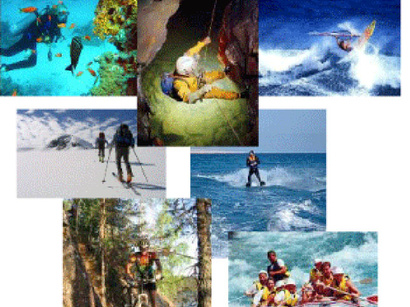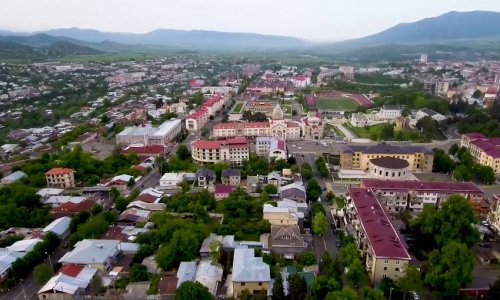Georgia and Azerbaijan, two South Caucasus countries that offer breathtaking natural beauty, architectural treasures and rich histories, are going all-out to develop their tourism industries.
In petroleum-rich Azerbaijan’s case, tourism development will help counter a drop in oil prices that many experts say will last for years. In Georgia’s case, tourism will offset a loss of business from its petroleum-producing neighbors.
The multibillion-dollar investments that Georgia, Azerbaijan and their private-sector partners are making in tourism infrastructure and promotion are paying off with surges in visitor numbers.
Both countries have wonderful attractions, including bustling cities, Caucasus-Mountain and beach resorts – Georgia on the Black Sea and Azerbaijan on the Caspian – and hot-spring spas.
Both also boast good food and hospitality. The mayor of Georgia’s Black Sea resort of Batumi noted that "for us, a guest is something precious. For a Georgian, each guest is like God.”
Georgia and Azerbaijan also offer thousands of sightseeing treasures, including natural parks, fortresses and historic buildings, art galleries and museums. Georgia, one of the world’s oldest bastions of Christianity, not only has many historic churches but also cave monasteries at Davit Gareja.
In addition to drawing visitors with their natural wonders and historic attractions, Georgia and Azerbaijan are working hard to become international sports venues.
Azerbaijan has been spending tens of millions of dollars to develop a world-class sports infrastructure that will bring in tourism revenue year after year. The latest international competition it’s landed is the First European Games from June 12 to 28. About 6,000 athletes are expected to compete in 20 sports.
Meanwhile, Georgia will host the European Youth Olympic Festival from July 25 to August 1. It is expected to draw 4,000 athletes between 14 and 18 in nine sports.
Georgia and Azerbaijan started ramping up their tourism efforts in the early 2000s. Georgia, which lacks the oil and gas that Azerbaijan has, wants to make tourism a spark plug of its growth. Realizing that oil and gas are finite, Azerbaijan began developing tourism to help diversify its economy.
Georgia and Azerbaijan have had great success wooing hoteliers in recent years. Dozens of hotels has risen in their capitals -- Tbilisi in Georgia and Baku in Azerbaijan – and other cities. They include big names like Hilton, Hyatt, Intercontinental, Marriott, Radisson and Sheraton.
An effort to transform Georgia’s Black Sea city of Batumi into a modern resort generated international headlines when American developer Donald Trump became a partner in the construction of accommodation-and-business complexes in Batumi and Tbilisi.
Georgia has also been creating world-class ski resorts in the Caucasus Mountains. After testing the slopes, Alberto Tomba, Italy’s Olympic Gold Medal winner, declared that the skiing complexes at Mestia and Gudauri have what it takes to host international competitions.
Georgia, which makes superb wines, is also restoring the town of Sighnaghi in its wine-country area of Kakheti to attract more tourists.
The country’s tourism investment led to almost 5.5 million people visiting in 2014, a sixteen-fold increase from 2004, before the tourism-expansion drive began.
In addition, tourism’s share of the country’s gross domestic product has doubled from 3.4 percent in 2004 to more than 7 percent. And tourism revenue is estimated at $2 billion a year, compared with $178 million in 2004.
Like Georgia, Azerbaijan has been building or modernizing tourism infrastructure over the past decade. It has renovated and added amenities at monuments and other historic sites, created the Shahdag ski resort – the country’s first -- and expanded and modernized airports.
One of Azerbaijan’s tourist-development strategies is invoking the names of legendary figures who trod its territory.
The most intriguing name is Marco Polo, who used the country as a jumping-off point on his Silk Road journey to China.
To cash in on its caravan heritage, Azerbaijan is building a network of Silk Road-themed attractions. They include reconstructions of caravansaries -- roadside inns where travelers could eat, sleep and feed and rest their camels and other animals.
As with Georgia, Azerbaijan’s tourism-development spending is paying off. Its visitor numbers have increased every year since 2003, reaching 2.5 million in 2014. And its tourism revenue has kept pace.
Despite this growth, tourism still accounts for only 1 percent of Azerbaijan’s gross domestic product. It will continue developing tourism until the sector accounts for 5 to 10 percent of GDP.
Both Georgia and Azerbaijan know they’re far from realizing their tourism potential, so they’re going to continue investing in the sector.
If Azerbaijan continues to increase its visitor numbers and revenue, its approach to developing its tourism industry may be a blueprint that other commodities-dependent countries will follow.
(The Hill)
www.ann.az
Follow us !











